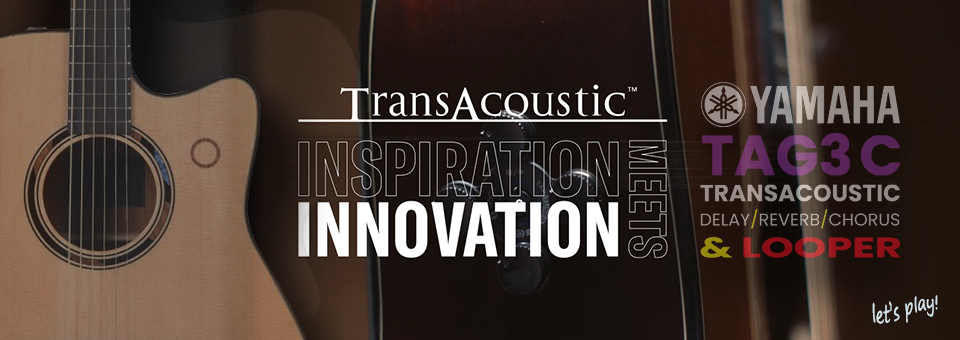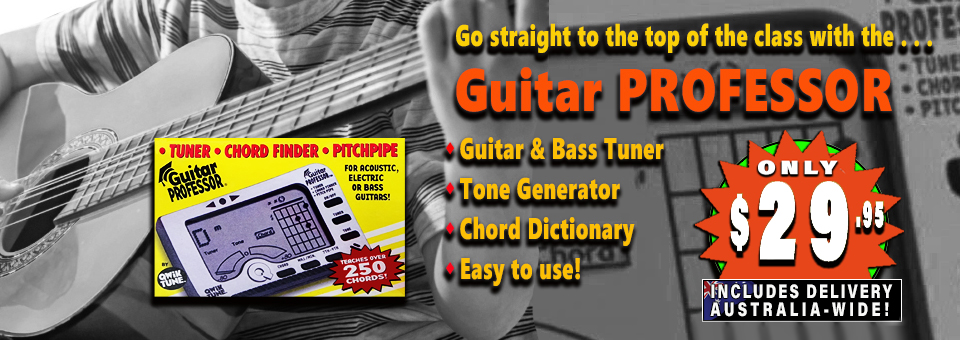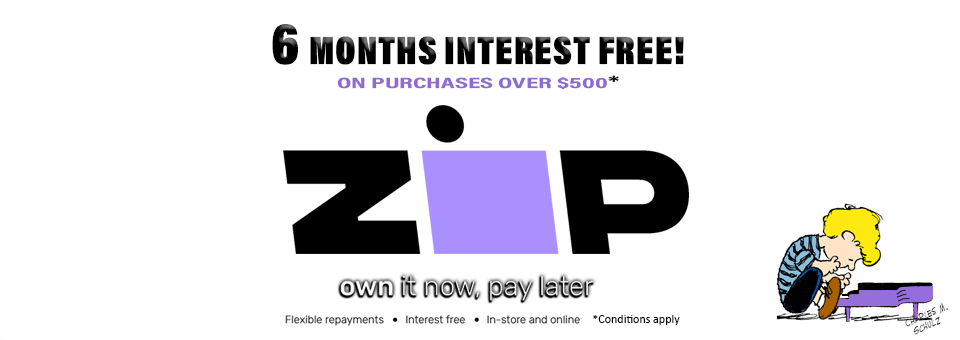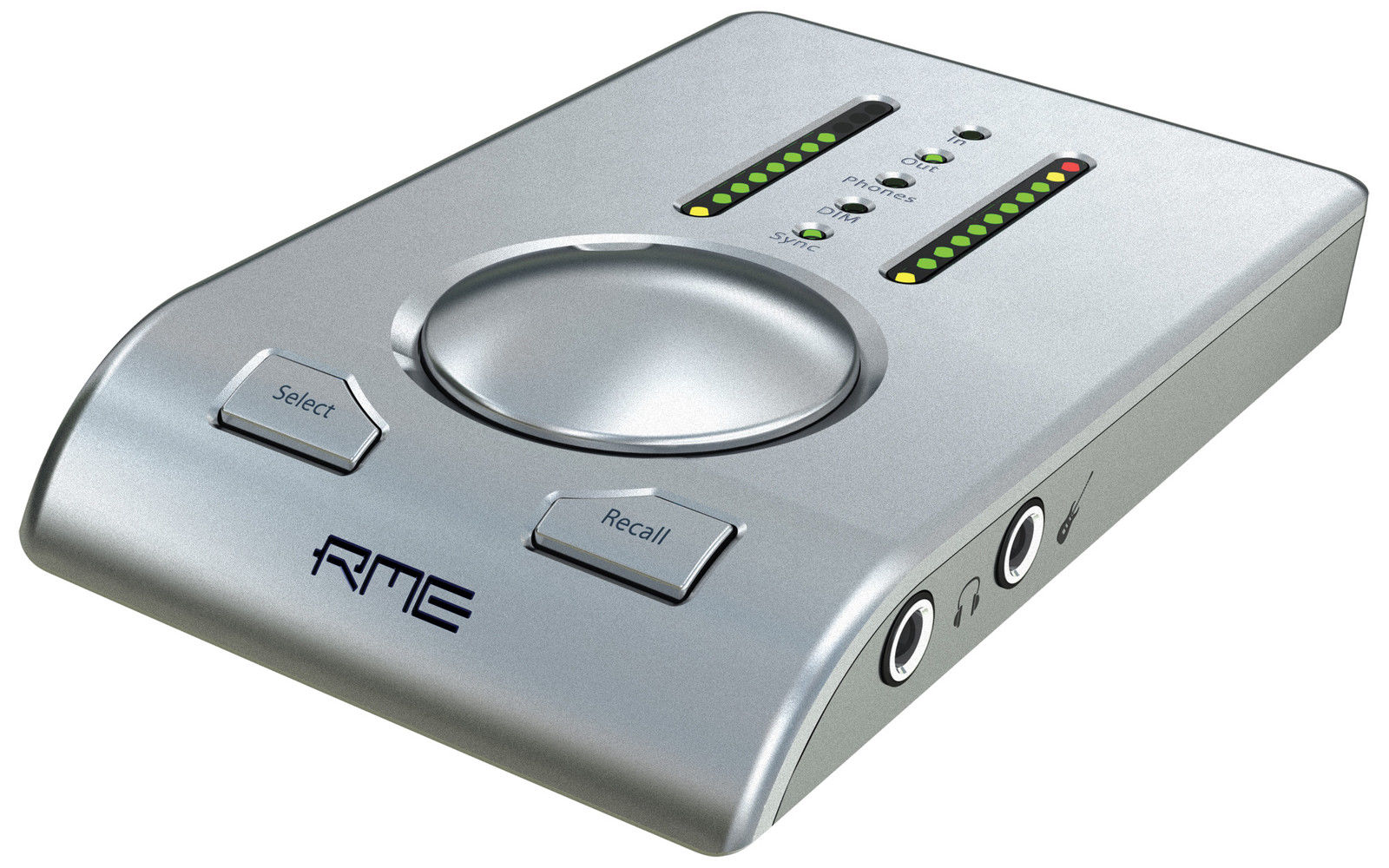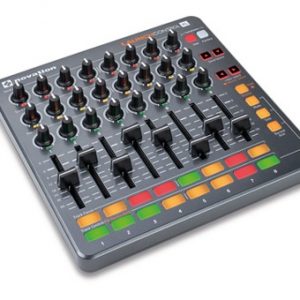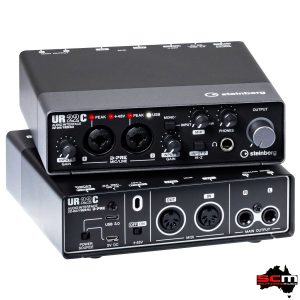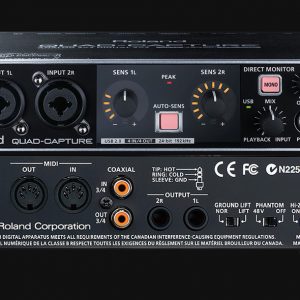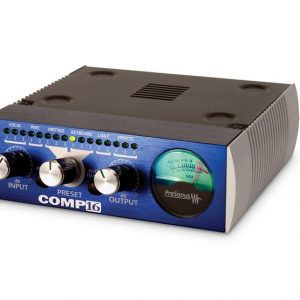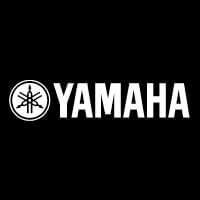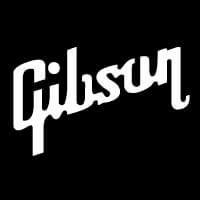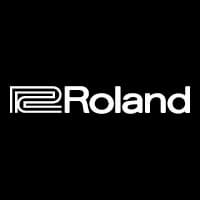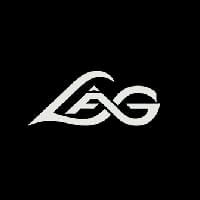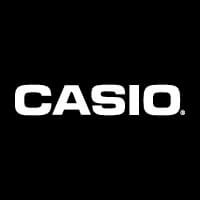RME BABYFACE
22-Channel, 192kHz Bus-powered Audio INTERFACE
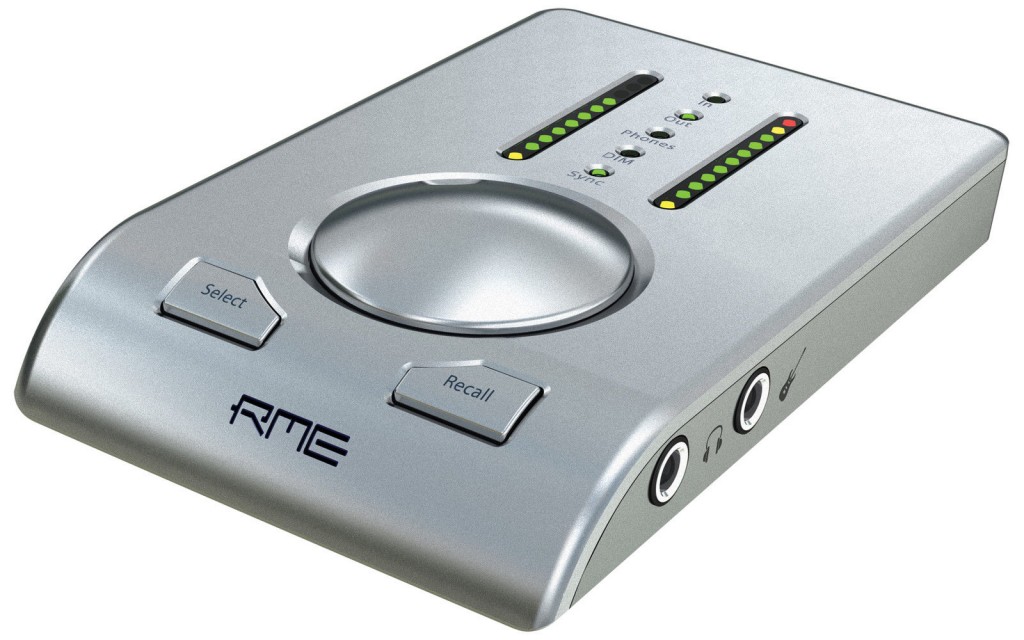
RME has given a face to digital audio. Starting with the Multiface as first serious/professional mobile I/O solution ever RME have raised the bar further and further, up to the extremely popular and successful Fireface series. So now that the racks are filled get ready to start to rock your desktop!
The Babyface is smooth on the outside for looks and feel, but has the balls inside: latest 192 kHz AD- and DA-converters, two reference class microphone preamps, SteadyClock – analog circuit design, features and function are truly RME – RME wouldn’t give their newborn anything second class!
The RME BabyFace also includes the new TotalMix FX…a TotalMix on steroids. TotalMix FX is loaded with tons of new features, improvements and 3-band parametric EQs, plus added echo and reverb…anything you need right out of the box and with near zero latency!
The Babyface uses RME’s Hammerfall USB audio core from the Fireface UC – another milestone in low latency audio interfaces and will give you outstanding performance and top sound in an ultra-portable, nicely designed and attractively shaped enclosure.
RME BabyFace Features
Analog I/Os
The balanced XLR I/Os and the TRS phones outputs use RME’s analog circuit design guaranteeing outstanding noise and distortion values. The latest generation AD/DA converters provide sample rates up to 192 kHz with an SNR of up to 115 dBA. Due to its efficient jitter reduction, SteadyClock(TM) guarantees pristine sound quality, even when clocking to an external digital source.
High-End Mic Preamps
Both digitally controlled preamps provide individually switchable 48V phantom power. A gain of up to 60 dB, adjustable in steps of 3 dB over a range of 51 dB, exceptional EIN performance even at low amplification settings, and extremely low THD+N values let these preamps surpass those of other devices that cost several times the price of the Babyface. All level settings are 100% recallable by the setup software and can be comfortably adjusted directly at the unit.
Digital I/Os
The incredible feature set includes an optical TOSLINK I/O, usable as ADAT port with SMUX support or SPDIF optical at up to 192 kHz. In combination with an ADAT converter, like RME ADI-8 QS or OctaMic II, the Babyface provides an incredible amount of 10 analog input and 12 output channels.
Phones Output
The additional headphone output, driven from a separate and dedicated DA converter, delivers the full sonic experience of up to 192 kHz and is available not only directly at the unit but also at the breakout cable. The phones level is easy to adjust and control with a simple click of the select button and the main volume knob.
Instrument Input
Directly plug in your guitar or other instruments by switching one input to Hi-Z input mode. Recording any instrument becomes a breeze and does not require any other hardware.
MIDI I/O
The integrated MIDI I/O completes the list of features and turns the Babyface into a creative audio system of universal usability. Do what you want – wherever you want!
Perfect Control
With one main control knob and two single buttons the elegant Babyface acts as a perfectly designed direct desktop control for all typical studio tasks: volume control, reference volume store and recall, volume dim, input selection/switching, input gain control – quick and easy access to all functions has been a major point during design and development. The LED bars serve as both level and gain meters, visually supporting the precise control of all inputs, outputs and headphone levels directly at the interface.
USB Made by RME
The Babyface provides RME’s unmatched USB pro audio technology for revolutionary ultra-low latencies on Mac and PC, by using two different optimized firmware versions for both operating systems. Like other RME USB 2.0* interfaces, the Babyface provides revolutionary ultra-low latencies even with multiple channels. The Babyface achieves latency values down to 48 samples on Windows and 14 samples on Mac OS X.**
* The Babyface is compatible to USB 3 chipsets.
** Minimal latencies are not guaranteed as they depend on the specific computer and application.
* Minimal latencies are not guaranteed as they depend on the specific computer and application.
List of tested systems (with Fireface UC)
Full mobility . The ultra-portable Babyface has been designed for bus-powered operation (some systems might require a special two USB connector cable – included). This turns the Babyface into the perfect partner for mobile recording of live performances, composing sessions in a park or coffee shop, or just wherever you go. Even if you just see it as a good looking HIFI music player or home studio companion – it will work perfectly on every desktop and laptop computer.
Breakout Cable
Rear Connectors . The Babyface provides two optical I/Os and a 15-pin D-sub connector. Both TOSLINK connectors for ADAT or SPDIF optical are on the back of the Babyface. The breakout cable – connected directly or via a special extension cable – offers the following connections:
– 4 x XLR balanced (Analog I/O)
– 1 x 6.3mm (1/4″) TRS for Phones (= Analog Out 3+4)
– 2 x DIN (MIDI I/O)
A breakout cable with unbalanced outputs is available as option (BF-BOCMKH).
More features
– Sample rates up to 192 kHz on all I/Os (including two ADAT channels via SMUX4)
– Two digitally controlled microphone preamps in high-end quality
– Two balanced universal inputs for line and instrument signals
– SteadyClock for maximum jitter suppression and clock refresh
– Direct operation with rotary encoder and keys
– TotalMix FX: Newly developed internal DSP high-end mixer
– Full mobility by bus powered operation
– DIGICheck, RME’s unique meter and analysis tool included
– Peak and RMS are hardware-calculated for all channels
TotalMix FX
The next generation of TotalMix delivers hardware mixing/routing with lots of new features and a highly improved usability. For a seamless integration of the new features TotalMix has been rewritten from the ground up. The DSP mixer now not only matches features of high-end digital consoles but even adds effects like a 3-band parametric EQ plus Low Cut on all input and output channels. The Babyface also provides a separate FX send bus for all inputs and software playback channels, feeding two effect engines: Reverb and Echo. Every output channel includes a FX return control for the FX output signal.
Features/Differences to classic TotalMix:
– New design and improved usability
– Control Room Section: Dedicated section for the main output (e. g. studio monitors) and other monitoring outputs (e. g. phones). All existing stereo output channels can be freely assigned as source for the control room section channels.
– Four definable groups for Solo, Mute and Faders
– Switchable Mono and Stereo channel view
– Channel Options: Stereo Width, MS Processing, Phase L/R
– Trim mode: Adjusts the volume for all routed signals of a channel. This option allows to modify the volume of all sends of a channel simultaneously, equalling a hardware’s trim functionality.
– Unlimited Undo and Redo
– FX Sends and Returns: One send bus for every input/playback channel with Reverb/Echo
– Expandable channel view for channel settings and EQ setup
– Slim channel mode for selected or all channels, to save space or give a meter bridge view
– 2-Row Mode: reduces the height of the mixer to two rows for smaller displays
The DSP-based hardware calculates RMS and Peak levels for all channels without causing any CPU load.
Babybag Babybag Babybag
The package of the Babyface includes:
– Extension cable
– USB power cable
– Breakout cable (XLR balanced)
– Babybag.
Technical Specifications
Input AD: 2 x XLR (2 x Mic/Line), servo-balanced.
Output DA (Main, 2 Channels): 2 x XLR, servo-balanced
Output DA (Phones, 2 Channels): 2 x 1/4″ TRS (Stereo), unbalanced (on breakout cable and interface)
Input Digital: 1 x ADAT optical or SPDIF optical
Output Digital: 1 x ADAT optical or SPDIF optical
MIDI: 1 x MIDI I/O via breakout cable (2 x 5-pin DIN jacks), for 16 channels low jitter hi-speed MIDI
Dynamic range AD: 108 dB RMS unweighted, 111 dBA
THD AD: < -100 dB (< 0.001 %)
THD+N AD: < -98 dB (< 0.0012 %)
Crosstalk AD: > 110 dB
Dynamic range DA: 112 dB RMS unweighted, 115 dBA
THD DA: < -104 dB (< 0.00063%)
THD+N DA: < -100 dB (< 0.001%)
Crosstalk DA: > 110 dB
Maximum Input Level for 0 dBFS: +12 dBu
Maximum Output Level @ 0 dBFS Line: +15 dBu
Maximum Output Level @ 0 dBFS Phones: +8 dBu
Sample rate internally: 32, 44.1, 48, 64, 88.2 kHz, 96 kHz, 176.4, 192 kHz
Sample rate externally: 28 kHz – 200 kHz
Frequency response AD, -0.5 dB: 50 Hz – 20.9 kHz (sf 44.1 kHz)
Frequency response AD, -0.5 dB: 50 Hz – 45.3 kHz (sf 96 kHz)
Frequency response AD, -1 dB: 30 Hz – 90 kHz (sf 192 kHz)
Frequency response DA, -0.5 dB: 10 Hz – 22 kHz (sf 44.1 kHz)
Frequency response DA, -0.5 dB: 10 Hz – 45 kHz (sf 96 kHz)
Frequency response DA, -1 dB: 5 Hz – 80 kHz (sf 192 kHz)
Jitter: Typical < 1 ns for internal, ADAT in
Jitter suppression: >30 dB (2.4 kHz)
Jitter sensitivity: PLL operates error-free even at 100 ns
Driver support
– Windows 7 / Vista / XP SP2 (32 & 64 bit)
– Apple Mac OS X 10.5 or up (Core Audio)
System Requirements
Computer with at least Pentium Core 2 Duo CPU (see the list of Tested Systems with USB chipsets).
Full Australian Warranty Applies!
_________________________________________________________________________________________________
RME BABYFACE
22-Channel, 192kHz Bus-powered Audio INTERFACE



